This morning marks the 23rd day of our Appalachian Trail journey—and once again it’s raining. Today, however, the rain is not an obstacle, for I am warm and dry at the hotel in Franklin, North Carolina, a steaming cup of hot coffee by my side. Of all the things we have encountered, it is rain that has proven to be both our most unexpected and our most constant companion. Rain has assumed the role of fickle taskmaster, ordering us at times to hide, to cover up, to sit, to pace, to think, to read, to write—and to wait out its aqueous desires. It is rain that is responsible for altering our trip, for forcing us off the trail when we preferred to hike on. But perhaps it has the right, because water, blood brother to the rain that has chosen to rule us, makes up 97% of our bodies.
As we crossed the hundred-mile mark in our journey, I understood that the wisdom of rain has helped us most. Rain has contrived to slow us down, and its dampening effect has afforded us time to reflect upon who we are and why we are here in the first place. Had it not been for the wisdom of the rain, we would have kept moving, kept pushing forward, kept distracting ourselves by the pleasure of our own swiftness. Instead, the rain crafted a new timeline for us and taught us to revise our expectations.
Because of this, time itself has become more malleable than we were aware it could be. Alexander and I have come to see that there is day, and there is night, and everything that falls between those two points is a dance marked only by the progression of our feet. Gone are the gradations we previously used to measure our days—the man-made specificity of hours, minutes, and seconds. Now there is only the footpath and our footfalls along the rise and fall of its geography.
In the event that you doubt the intelligence of rain and believe I’m giving it too much credit, let me assure you: There exists a great and expanding body of evidence showing that water possesses a memory—and, by extension, a consciousness. Its molecular structure gives water the ability to absorb a resonance from everything it touches. In our case, the rain that has been our boon companion has fallen directly from the heavens, through the canopy of forest, and made its way from the tops of mountains, over rocks and plants. It has skipped across the backs of animals, and around the base of ancient trees, finally plunging through the earth, and exiting in a white vein of quartz crystal, before finding its way to us. In a very real way, we have been bathed in the wisdom of all the experiences this liquid has absorbed in its journey.
* * *
As I sit in the lobby at the Hampton Inn this morning, I watch families and couples mill about, lining up for the breakfast bar, getting their coffee and juice, making their plans for the day. It is Sunday, and most of them will be traveling home—to Atlanta and other destinations in Georgia, Florida, Alabama, and Mississippi, as the license tags in the parking lot tell us. Alexander and I feel apart from this crowd—partly because tomorrow we return to the trail, not to regular jobs nor to the identifying experience of home and the accumulated encumbrance of personal property. But partly, too, because we have allowed the forest to twine itself into us, and now we feel drawn back, as if the trail were an umbilical cord that siphons nourishment into us from the trees and mosses and boulders that line it.
Last night we strolled down the hill to a BBQ restaurant. It was like magic—and a bit shocking. We ordered. The food arrived. We dined. All week, we were engaged in a different sort of life, one in which we walk all day and filter our drinking water from springs that poured forth from the earth—not a tap, not a waitress’s pitcher. Alexander built fires to keep us warm and cooked simple meals. Our supplies are finite; they have to last a certain number of days, and yet in the midst of this ascetic routine, we were blissfully happy.
After we ate our BBQ, we both felt we had cheated, had broken an honorable code of the forest. At the end of our meal we simply paid the bill and left with our box of leftovers. We did not have to wash our bowls with leaves and sand, nor be concerned with the amount of water we used to complete that task. We did not have to follow one another into the darkness of the forest to make sure we were hanging our food far enough from our tents to keep us safe from bears. As we stepped through the restaurant door, Alexander and I exchanged a look. Our bellies were full, but we had done nothing to acquire such an opulent feast. Nestled way down inside our tummies, hidden beneath the layers of barbecued chicken and juicy rib-eye steak, we both felt a tiny, nagging sense of guilt.
* * *
It is a little after ten a.m., now, and the hotel lobby is quiet, except for the blaring beat of Fox News, which serves as a harsh reminder of the world that awaits beyond the lobby. I try my best to be optimistic, but the frantic anxiety that pours from the flat screen television seemingly has no end. It is easy to succumb. I realize, of course, that the world as it is today is the result of the choices we have made as a society. As a citizen of that world, I have some responsibility for its current state. Since we began this journey, I find myself asking, “How can I help to change it?”
However, that is a big question, larger than I feel I can take on today. For now, Alexander and I are still journeymen, following a path in the forest. So I purposefully erect a wall that separates the experiences of the past three weeks from the world that waits hungrily for us to step off the trail for good. Today, I will write. I will hike my “hundred-mile memory,” retracing the past weeks and attempting to unravel all that has happened. The world will wait.
* * *
Early on September 17th, I packed my gear in the trunk of the old Caddy and ran back inside the house to gather a few items I had left on the kitchen counter. I took a good long look around, absorbing the art on the walls, the placement of a few photos on the fridge, the color of the two worn chairs in the dining room, and the intricate but worn Berber rug that covered the floor. Our dogs, Ila Mae, Boo Boo, and Ruby Rose lay on their cushy dog beds with several of their favorite toys strewn about. I got down on the floor and put my forehead to each of theirs and told them I loved them. (They are all close to fifteen years old. I knew that if I left even for a few days, I risked not seeing one or another of them again. And I was departing for six weeks.)
Then I turned to my wife, Elisabeth, who stood, coffee in hand, looking beautiful—even as the my-God-you-are-a-huge-pain-in-the-ass look crossed the landscape of her early morning face, only to be followed by the I-love-you-more-than-anything-so-please-don’t-up-and-die-on-me-now look the next gut-wrenching instant. It was maybe the sweetest look I have ever had from from her. It said everything about the twenty-plus years we have spent together.
This—the house, the dogs, my beautiful wife—I wanted to remember it all as clearly as possible. Just in case. On the long hike on the Appalachian Trail, anything could happen. There are lots of possibilities for calamity. Not to mention the damn bears.
It can be hard for a guy to process an immense load of conflicting emotions—which is exactly what I was encountering in that moment. I stood there for a moment, spare ZipLock bags, hot cocoa mix, and Q-tips filling my arms, looking at my wife and wondering, “How in the hell did my world get so complex, so rich, and so beautiful all of a sudden?” Then I flashed on the good career I had pretty much just pulled the plug on so I could make this insane journey, and how all the great people whom I had worked with had always relied on me to rescue them from Computer Hell, and I asked myself, “What in the hell are you doing, sport?” But by then it was too late to consider the consequences of my actions.
So I did the next best guy thing I could think of: I leaned over to give my wife a kiss and told her, “I will call you later, baby, when we get on the road.” Then I took a virtual snapshot of everything in my mental viewfinder and stored it, along with everything I was thinking and feeling, safely away in my mind—just in case the worst actually did happen, like a bear had my skull firmly between his jaws or I slipped over some incredibly high cliff. Then, at least, there would be a bright moment when I could reach into that hiding place in my brain and replay for one last, sweet second all that I was now experiencing. And if the bear wasn’t crunching my skull too hard, or if the fall wasn’t too short, I would even have time to say to myself, “Yup, sport, your life was complex and rich and beautiful, and you were one lucky son of a bitch.”
Then Elisabeth, with the wisdom of a woman who has known me for twenty-plus years, said quietly, “You are coming home aren’t you?”
Well, that encompassed a lot of territory—and I was already on emotional overload—so I simply said, “Of course I am, baby. Why would you ask something like that?”
But I know why she asked. Elisabeth-who-knows-me knows even a dumb ass like me wouldn’t cut loose from her, the dogs, my mom, my job, and all the other wonderful people and things in my life—unless something was up. And something was up. As Elisabeth saw more clearly than I did myself, I was headed off on a pilgrimage—and pilgrimages have a funny way of changing people.
A long moment crossed between us in that kitchen. I held onto her, still clutching the ZipLock bags, cocoa, and Q-tips, for so long her coffee grew cold. Then we looked at one another for another prolonged minute, before I gave her a final kiss and walked out the door.
* * *
As the old silver Caddy made its way north along the ribbon of I-75 to Amicalola State Park in north Georgia, I pondered the implications of making a pilgrimage. In America, we don’t really recognize the concept. Walking the Appalachian Trail is as close as to the idea of “pilgrimage” as we generally come in the good ol’ U.S. of A. And if one actually attaches some shade of religious or spiritual meaning to their “walk in the woods,” it is often overshadowed by the other reasons one has for making the hike.
Five years ago, I thought I had made a two-thousand-mile pilgrimage when I rode my bicycle from St. Augustine, Florida, to Taos, New Mexico. But as I look back on that two-month journey, I can see it was just the beginning—a preamble to the pilgrimage I am on now. The whole damn thing’s so tricky.
I remember a movie from the 1980s, starring Al Pacino and Jack Warden, titled And Justice for All. In the movie Jack Warden plays a circuit court judge who has seen too much greed, corruption, and horror. He wants to end his life, but the barrels of his shotgun are too long to fit in his mouth and still allow him to reach the trigger. Instead, he plays a game he calls “Halfway Out and a Little Farther.” Every day he fills the fuel tanks of his helicopter and heads out to sea, flying until they’re half empty, then just a little farther, to see if he can still return safely home. In the end he never does complete his wish for death, but, instead, finds a level of peace in the attempt.
I don’t think that’s me, but I do find that the world can be a difficult place, a place in which hope is hard to find and maintain. But in some strange way, I’m discovering that the act of making a “pilgrimage”—whatever you take me to mean by that—has allowed hope to work its way into my life.
* * *
As early as Friday morning, I was not certain I would continue this trip. Franklin, North Carolina, seemed like a good place to call it quits. It was hard. Too hard. Then Friday morning, Alexander and I started up Albert Mountain just before lunchtime. The last part of the climb is an absurdly steep chute, a third of a mile in length. About half that climb, you’re using your hands as well as your feet just to keep yourself moving upward. The trail is treacherous, and one slip would ruin your day.
At about the half-way mark, I started laughing at the complete ridiculousness of the climb. Then something snapped—and somehow, I simply overcame whatever had been holding me back, and I finished the climb. When we made it to the top of Albert Mountain, we enjoyed one of the most outstanding views we had seen on the entire Appalachian Trail, so far. Then Alexander and I shared a summer sausage we had saved for lunch. As I gazed out across the view, I said, “I wish we could just keep walking” (exactly as my lovely wife anticipated I would).
He looked at me and said, “Really, Dad?” I could see the light in his eyes, that spark of hope most young people carry with them. At twenty-four Alexander has not seen so much of the world that he is daunted, so a pilgrimage is not necessary for him to revive his spirit. He is in this for the challenge and the experience. His dad, on the other hand, needs a little bit more to encourage him to face the challenges. But in that moment, our desires intersected, and the tops of the Appalachian Mountains protruding from the clouds in the distance looked like islands rising out of the sea. Right then, anything was possible. We sat back, lost in our own thoughts and devoured the rich slices of sausage, each relishing his own hundred-mile memory.
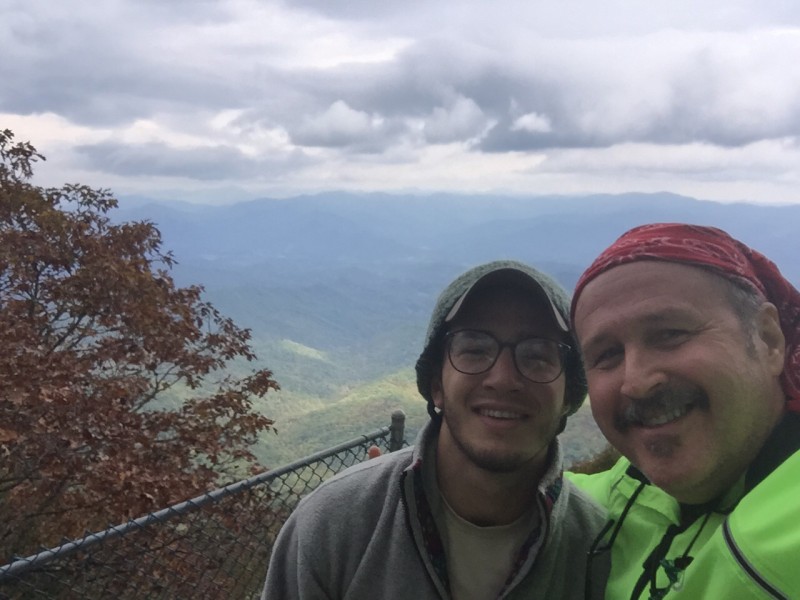
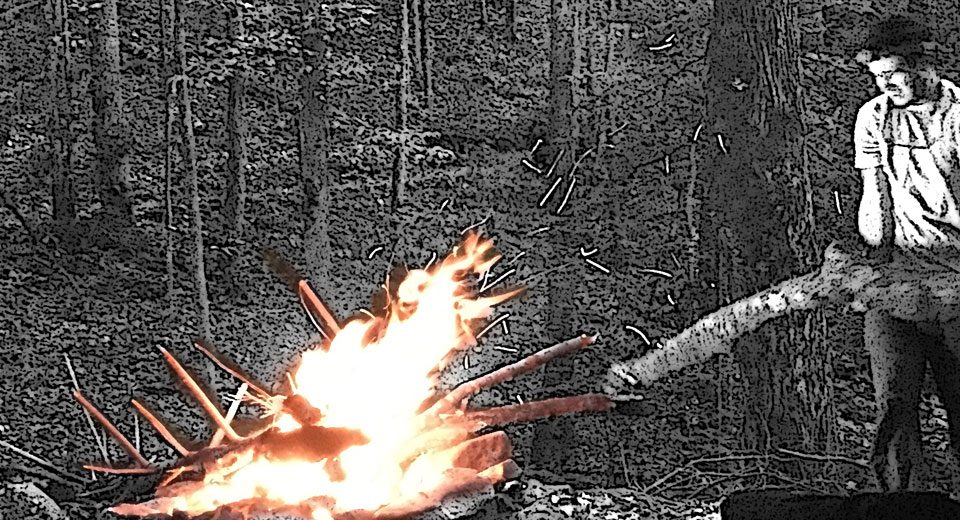
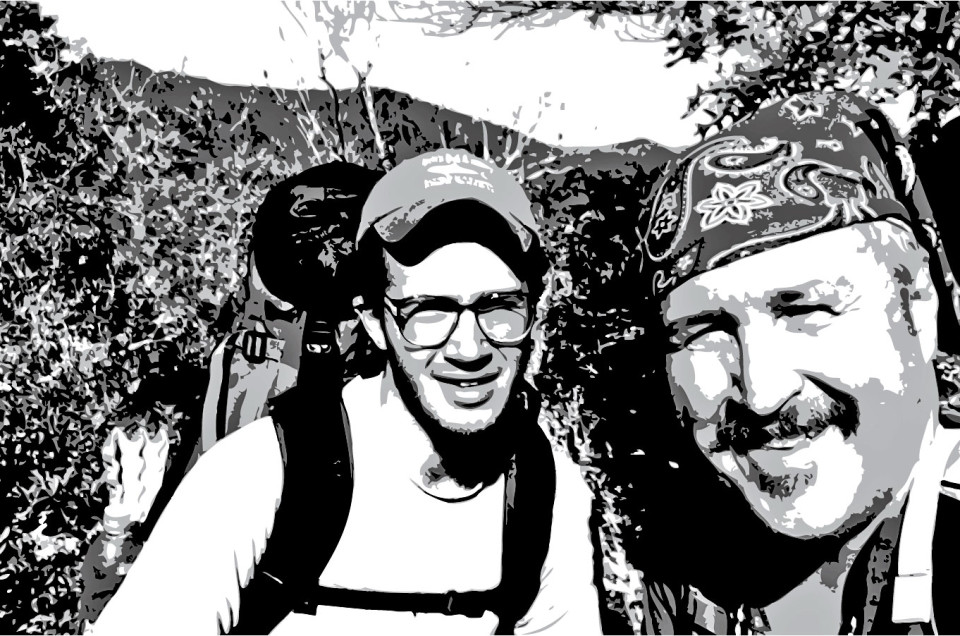
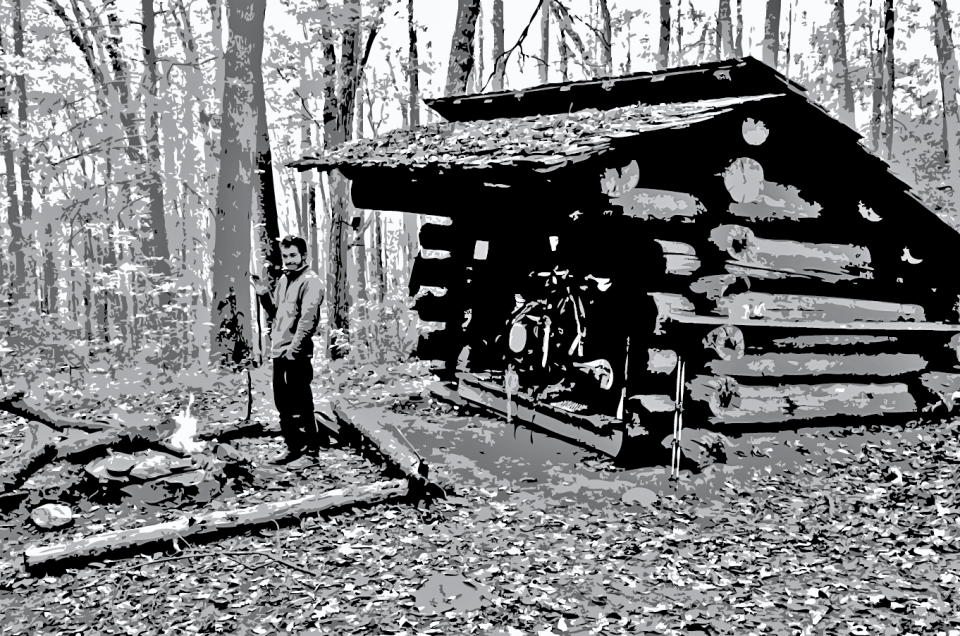
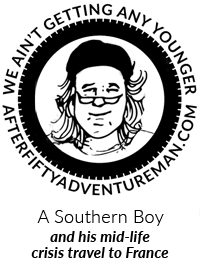
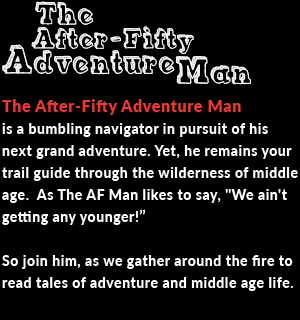









6 Comments
My son and I “re-did” an AT hike from 18 years ago this past weekend. We celebrated his upcoming marriage and included a training/shakedown hike for my AT 2017 thru. An AT bachelor party sitting on a 2×6 bench before a campfire eating mac and cheese with spicy tuna and sharing a flask of bourbon. The difference between that “10 year old on the trail while whining and moaning the whole time” near disaster and what we shared Saturday night was immense. I think he now understands why having children should be dependent upon the parents ability to afford Swiss boarding school until they graduate from college. Or luck. But we still had a great experience and talked more than we have for a long time. Your father son story rings so true and hits all the buttons. Hike on!
Hi Mike
Thanks for the recap on your journey with your son. We are sitting on the top of Siler’s Bald as I write you and this evening we shall break out the bourbon too! Look forward to hearing about your thru hike plans when I return.
Warm regards
Hugh
I anticipate writing while on the trail but writing on a phone makes my hair hurt. What is your method?
Where is the KLEENEX?? I need KLEENEX!!! Lots of KLEENEX!!!
Hi lil Susie
Don’t cry ! But glad you did.
Love
Big Hughie
happy 100to you and your son!!!!
sssssssssoooooooooo very proud of you!!!!
thinking of water you drink running off an animal first did give me pause…….
may your footfalls be secure and rich with more insights and memories to cherish.